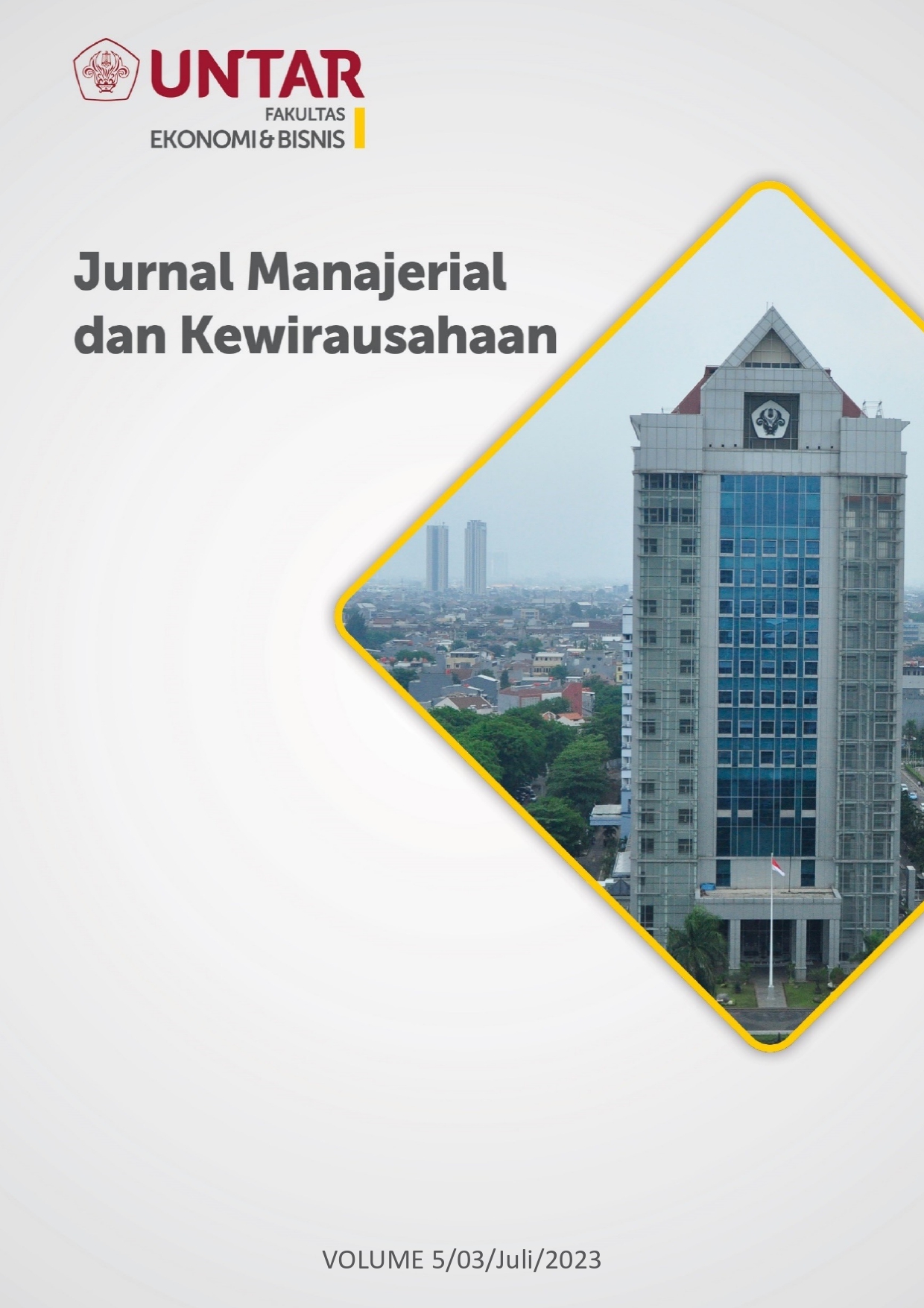Pengaruh Kompensasi terhadap Kinerja Karyawan PT Maxiar Indosurya yang Dimediasi oleh Motivasi Kerja
Main Article Content
Abstract
This research was conducted with the aim of knowing the effect of compensation on employee performance, the effect of compensation on work motivation, and the effect of work motivation on employee performance. In this study, a quantitative paradigm was used as the basis of this research,with a causal type of research. The research object used was PT Maxiar Indosurya. The data collection method is in the form of a questionnaire with a 5-point interval scale. The number of respondents to the research is the population of PT Maxiar Indosurya employees as many as 60 people. then the data were analyzed using SmartPLS software. From this study it can be concluded that compensation has a positive effect on employee performance,compensation has a positive effect on work motivation, and work motivation has a positive effect on employee performance.
Article Details

This work is licensed under a Creative Commons Attribution-NonCommercial-ShareAlike 4.0 International License.
This work is licensed under a Jurnal Muara Ilmu Ekonomi dan Bisnis Creative Commons Attribution-ShareAlike 4.0 International License.,/p>
References
Agustine, K. B. & Andani, K. W. (2023). Pengaruh Kompensasi dan Motivasi terhadap Kinerja Karyawan PT. Hasta Jaya Marina di Jakarta Barat. Jurnal Manajerial dan Kewirausahaan, 5(2), 353-362. https://doi.org/10.24912/jmk.v5i2.23404
Angellina, D. & Masman, R. R. (2023). Pengaruh Motivasi dan Kepuasan Kerja terhadap Kinerja Karyawan PT Mega Tirana Internasional. Jurnal Manajerial dan Kewirausahaan, 5(1), 159-166. https://doi.org/10.24912/jmk.v5i1.22563
Bangun, W. (2012). Manajemen sumber daya manusia. Jakarta: Erlangga.
Hair, J. F., Ringle, C. M., & Sarstedt, M. (2011). PLS-SEM: Indeed a Silver Bullet. Journal of Marketing theory and Practice, 19(2), 139-152.
Haryani, S. S., Hamid, D., & Susilo, H. (2015). Pengaruh Kompensasi Terhadap Motivasi Kerja dan Kinerja (Studi Pada Karyawan PT. Telekomunikasi Indonesia, Tbk Malang). Jurnal Administrasi Bisnis (JAB), 25(1), 1-7.
Hasibuan, M. S. (2016). Manajemen Sumber Daya Manusia. Jakarta: PT Bumi Aksara.
Jatmiko, E. D., Swasto, B., & Eko, G. (2015). Pengaruh Motivasi Kerja dan Komitmen Organisasional terhadap Kinerja Karyawan (Studi Pada Karyawan Kompartemen Pabrik II PT. Petrokimia Gresik). Jurnal Administrasi Bisnis (JAB), 21(1).
Kuncoro, M. (2013). Metode Riset untuk Bisnis dan Ekonomi: Bagaimana Meneliti dan Menulis Tesis. Jakarta: Penerbit Erlangga.
Leonardo, E., & Andreani, F. (2016). Pengaruh Pemberian Kompensasi terhadap Kinerja Karyawan pada PT. Kopanitia. AGORA, 3(2), 28-31.
Mathis, R. L., & Jackson, J. H. (2011). Human Resource Management. USA: Cengage Learning. Maturidi, A. D. (2014). Metode Penelitian Teknik Informatika. Yogyakarta: Deepublish.
Niles, N. J. (2013). Basic Concepts of Health Care Human Resource Management. USA: Jones & Bartlett Publishers.
Nugroho, A. E., Hasanuddin, B., & Brasit, N. (2011). Pengaruh Coaching Terhadap Motivasi Kerja dan Kinerja Individual (Studi Kasus pada Karyawan Bagian Support Services Departemen Production Services PT. International Nikel Indonesia, Tbk). Jurnal Universitas Hasanuddin.
Prihartanta, W. (2015). Teori-teori Motivasi. Jurnal Adabiya, 1(83).
Purnama, C., & Kempa, S. (2016). Pengaruh Kompensasi dan Disiplin Kerja Terhadap Kinerja Karyawan CV Cahaya Citrasurya Indoprima. AGORA, 4(2), 33-39.
Ramadhan, M. F., & Darmawan, A. (2018). Pengaruh Kemampuan Kerja, Motivasi, Disiplin Kerja dan Pengembangan Karir dalam Meningkatkan Kinerja Karyawan PT. Taman Rekreasi Sengkaling. Jurnal Administrasi Bisnis, 61(3), 125-133.
Randhawa, G. (2007). Human Resource Management. New Delhi: Atlantic.
Saputri, D. L. (2018). Hubungan Kompensasi dengan Kinerja Karyawan Food and Beverage Department di Hotel Grand Central Pekanbaru. JOM FISIP, 5(1), 1-11.
Sekaran, U., & Bougie, R. (2016). Research Methods for Business: A skill building approach. United States: John Wiley & Sons.
Sekaran, U., & Bougie, R. (2020). Research methods for business: A skill building approach. In Long Range Planning (Vol. 26, Issue 2). John Wiley & Sons. https://doi.org/10.1016/00246301(93)90168-f
Stufflebeam, D. L., & Zhang, G. (2017). The CIPP Evaluation Model: How to Evaluate for Improvement and Accountability. Guilford Publications.
Sugiyono. (2014). Metode Penelitian Kuantitatif, Kualitatif dan R & D. Bandung: Alfabeta.
Trilaksono, Y. A. (2016). Pengaruh Kompensasi Terhadap Kinerja Karyawan Pabrik Gula Rejo Agung Madiun. Equilibrium: Jurnal Ilmiah Ekonomi dan Pembelajarannya,, 4(2), 156-169.
Turangan, J. A. & Setiawan, F. P. (2022). The Effect of Compensation, Work Environment, and Organization Culture on Employee Job Satisfaction. International Journal of Advanced Engineering and Management Research, 7(4), 36-44. http://dx.doi.org/10.51505/ijaemr.2022.7403
Ulfa, M., Rahardjo, K., & Ruhana, I. (2013). Pengaruh Kompensasi terhadap Motivasi Kerja dan Kinerja Karyawan (Studi pada Karyawan Auto 2000 Malang Sutoyo). Jurnal Administrasi Bisnis, 3(1).
Violetta, V. & Edalmen, E. (2020). Pengaruh Kompensasi terhadap Retensi Karyawan dengan Kepuasan Kerja sebagai Variabel Mediasi. Jurnal Manajerial dan Kewirausahaan, 2(4), 1086-1095. https://doi.org/10.24912/jmk.v2i4.9894
Winarni, E. W. (2018). Teori dan Praktik Penelitian Kuantitatif Kualitatif. Jakarta: Bumi Aksara .



